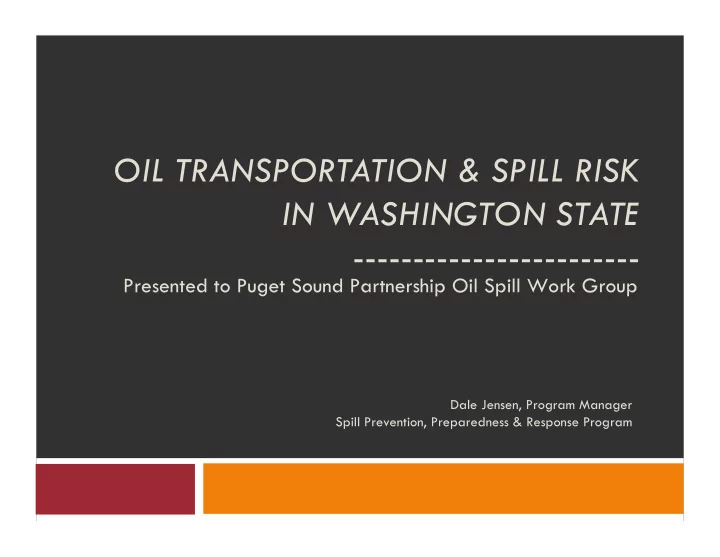

OIL TRANSPORTATION & SPILL RISK IN WASHINGTON STATE ------------------------ Presented to Puget Sound Partnership Oil Spill Work Group Dale Jensen, Program Manager Spill Prevention, Preparedness & Response Program
Changes in movement of oil in and out of the state Increase demand and production of oil • BP Cherry Point sands from Canada, and Bakken shale • Phillips 66 Ferndale Refinery oil from Montana and North Dakota. • Tesoro Anacortes Change in mode of transportation of oil Refinery • Shell Puget Sound from vessel to rail. • Targa Sound There are 10 existing and proposed Terminal • US Oil and Refining terminals that could receive crude oil by • Westway Terminal rail. • US Development • Imperium Biodiesel • Tesoro Savage Terminal
Vancouver BC: Kinder Morgan Entrance from BC Vancouver BC: Delta Port Cherry Point: BP Refinery Cherry Point: Gateway Coal Terminal Anacortes: Shell Refinery and Tesoro Refinery Cherry Point: P66 Refinery Entrance to Strait of Juan de Fuca Tacoma: US Oil Refinery Tacoma: Targa Oil Terminal Grays Harbor: Imperium Oil Terminal Entrance to Grays Harbor: US Development Oil Terminal Grays Harbor Idaho Grays Harbor: Westway Oil Terminal Entrance to Columbia River Port of St. Helens: Port Westward Oil Terminal Oil and coal from Longview: Millennium Coal Bulk western states by rail Terminal Port of Morrow OR: Morrow Pacific Coal Vancouver: Tesoro Savage Terminal Oil Terminal Oregon Coos Bay, OR
Proposed Puget Sound Projects Gateway Pacific Terminal Projected Increase Bulk carriers new 487 ships/yr new 228 fueling operations/yr Oil barges Kinder-Morgan TransMountain Projected Increase Pipeline & Burnaby export terminal Oil tankers additional 358 ships/yr Bunkering additional 100 fueling operations/yr
Proposed Projects - Vancouver, BC area Proposed Projects Projected Increase Deltaport expansion Container ships = additional 15/yr Bunkering = additional 6 fueling operations/yr Westshore expansion adjacent to Coal (bulk) ships = additional 104/yr Deltaport Bunkering = additional 49 fueling operations/yr Neptune Bulk ships = additional 176/yr Bunkering = additional 83 fueling operations/yr Fraser Surrey Docks/Texada Coal (bulk) ships = new 40/yr Bunkering = new 19 fueling operations/yr Richardson Grain Grain (bulk) ships = additional 28/yr Bunkering = additional 13 fueling operations/yr Deltaport expansion (Creating a new An uncertain number of container ships & fueling operations Terminal 2)
What does this all mean? Implications for Washington State Spill Prevention, Preparedness & Response
Why are we concerned? More traffic from vessels and rail in and along our waterways. Several initiatives examining the oil spill risk associated with increasing vessel traffic in the state and particularly within Puget Sound and adjacent waters. These include: Puget Sound Partnership / Ecology sponsored Vessel Traffic Risk Assessment(VTRA) Gateway Pacific Terminal (GPT) Vessel Traffic Study BP follow-on Vessel Traffic Assessment US Coast Guard analysis comparing US and Canadian marine safety and environmental protection standards US Coast Guard assessment of Canadian oil sands transportation risk Several additional rail/vessel oil movement projects in Grays Harbor and on the Columbia River
Why are we concerned? Lack of prevention and response preparedness planning due to gaps in the state’s regulatory authority for rail Oil property characteristics, what it might mean for: Health and human exposure Responder safety Current cleanup technology in regards to the “sinking” oil Gaps in incident response framework between rail companies and the state adopted incident command system Anticipated decline in revenue to support Spills Program work Crude coming into our state’s refineries by ship are taxed (Oil Spill Administration Tax – commonly known as the barrel tax) per barrel of oil Crude coming into our state by rail and pipeline are not taxed
Proposed Action 2014 Legislative Session Eliminating the Vessel Response Account No longer need for funding Neah Bay Response Tug Change of definition of “oil” Concern that current definition does not include undiluted bitumen 2015 Legislative Session Additional resources to address increased risk as findings and recommendations from risk assessment studies and other gap analysis
What’s Next? Budget, Planning and Legislative Session
Budget & Program Planning Program budget is in take with all proposed budget legislation Ecology is in the 2013-15 Program Planning cycle Program Plan expected July 2013 Update Strategic Plan to include: New initiatives include analysis of risk posed by new and changing oil movement. Risk assessment and management – outcome of risk studies
Legislation Timeline Legislative Track 2014 -2015 May – June July – Sept Oct – Nov Dec – Jan Agency Request Draft Bill Language Identify legislative Pre-file agency Legislation (Initial Decision Package staff and potential request legislation Proposal) Stakeholder Meetings sponsors Supplemental Budget Briefing PSP Oil Spill Engage stakeholders session starts Paper Workgroup in detail discussions Draft Legislative Puget Sound Focus Sheet Harbor Safety (Problem, Solution, Committees Proposal Tribes (G-G Statements) consultation) Request Legislation Industry Development Plan Local officials and communities
QUESTIONS? For more information: Website: http://www.ecy.wa.gov/programs/spills/spills.html NWAC: www.rrt10nwac.com How to report a spill: 1-800-OILS-911 Thank You.
Recommend
More recommend